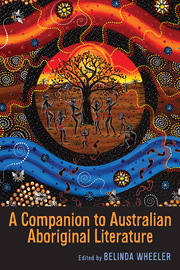Book contents
- Frontmatter
- Contents
- Foreword
- Acknowledgments
- Chronology
- Introduction: The Emerging Canon
- 1 Indigenous Life Writing: Rethinking Poetics and Practice
- 2 Australian Aboriginal Life Writers and Their Editors: Cross-Cultural Collaboration, Authorial Intention, and the Impact of Editorial Choices
- 3 Contemporary Life Writing: Inscribing Double Voice in Intergenerational Collaborative Life-Writing Projects
- 4 European Translations of Australian Aboriginal Texts
- 5 Tracing a Trajectory from Songpoetry to Contemporary Aboriginal Poetry
- 6 Rites/Rights/Writes of Passage: Identity Construction in Australian Aboriginal Young Adult Fiction
- 7 Humor in Contemporary Aboriginal Adult Fiction
- 8 White Shadows: The Gothic Tradition in Australian Aboriginal Literature
- 9 Bold, Black, and Brilliant: Aboriginal Australian Drama
- 10 The “Stolen Generations” in Feature Film: The Approach of Aboriginal Director Rachel Perkins and Others
- 11 A History of Popular Indigenous Music
- Notes on the Contributors
- Index
10 - The “Stolen Generations” in Feature Film: The Approach of Aboriginal Director Rachel Perkins and Others
Published online by Cambridge University Press: 05 September 2013
- Frontmatter
- Contents
- Foreword
- Acknowledgments
- Chronology
- Introduction: The Emerging Canon
- 1 Indigenous Life Writing: Rethinking Poetics and Practice
- 2 Australian Aboriginal Life Writers and Their Editors: Cross-Cultural Collaboration, Authorial Intention, and the Impact of Editorial Choices
- 3 Contemporary Life Writing: Inscribing Double Voice in Intergenerational Collaborative Life-Writing Projects
- 4 European Translations of Australian Aboriginal Texts
- 5 Tracing a Trajectory from Songpoetry to Contemporary Aboriginal Poetry
- 6 Rites/Rights/Writes of Passage: Identity Construction in Australian Aboriginal Young Adult Fiction
- 7 Humor in Contemporary Aboriginal Adult Fiction
- 8 White Shadows: The Gothic Tradition in Australian Aboriginal Literature
- 9 Bold, Black, and Brilliant: Aboriginal Australian Drama
- 10 The “Stolen Generations” in Feature Film: The Approach of Aboriginal Director Rachel Perkins and Others
- 11 A History of Popular Indigenous Music
- Notes on the Contributors
- Index
Summary
For most of the many years of Australian cinema, Aboriginality, as McFarlane, Mayer, and Bertrand (the editors of The Oxford Companion to Australian Film [1999]) note, was a rare subject. Then it emerged in a handful of films, either in negative stereotypical terms, as in Charles Chauvel's Jedda (1953), or in positive, mythic terms, as in Nicholas Roeg's Walkabout (1971) or Peter Weir's The Last Wave (1977). Either way, Aboriginality was filtered through a white consciousness that arguably distorted it. Then, beginning in roughly 1980, there were many films that reflected a white social consciousness insofar as they dealt with the injustices that Aboriginal people had experienced. Simon Wincer's Quigley (1990) highlighted nineteenth-century injustices, such as forcing Aboriginals over cliffs to their death; films such as Craig Lahiff's Black and White (2002) and Paul Goldman's Australian Rules (2002) emphasized more recent injustices in the court of law or the field of sport. But even these films essentialized Aboriginals: they were neither the dangerous figures of Jedda nor the spiritual ones of The Last Wave; instead, they were essentialized as victims—more so in earlier decades, less so in more recent ones. Other films, frequently ones involving a degree of white-black collaboration, got somewhat beyond essentializing. Bruce Beresford's The Fringe Dwellers is an example from the 1980s; Esben Storm's Deadly is an example from the 1990s.
- Type
- Chapter
- Information
- A Companion to Australian Aboriginal Literature , pp. 173 - 186Publisher: Boydell & BrewerPrint publication year: 2013



